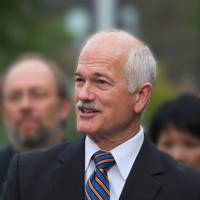When the writ was dropped a few weeks ago for Canada's third election in five years, the conventional wisdom was that it would be a dull affair. Canada has weathered the Great Recession better than almost any other advanced industrial nation, and the Conservatives under Prime Minister Stephen Harper have maintained consistent, if unspectacular leads over the opposition Liberals. The only questions seemed to be whether Harper, who has led a minority government in parliament since 2006, would achieve his long-coveted majority, and who would replace Liberal leader Michael Ignatieff after what was certain to be the third straight defeat for Canada's "natural party of government." The left-wing New Democratic Party (NDP) -- Canada's perennial third party -- was largely an afterthought, with its leader Jack Layton's aspirations to the premiership dismissed out of hand.
But in the home stretch of the campaign, the NDP suddenly surged into first place in Quebec, largely at the expense of the separatist Bloc Quebecois, which has dominated Canada's second-most-populous province since the early 1990s. With a flurry of media coverage, the late surge went national, and the NDP is now threatening to push the Liberals into a humiliating third-place finish. Some polls even show the party winning enough seats to form a coalition with the Liberals as minority partner. With the NDP's momentum showing no signs of flagging, the May 2 elections now look like they may produce the biggest realignment in Canadian politics in generations. What the pundits appear to have overlooked is the degree to which this election has centered on Canada's national identity as well as its role in the world.
While most Canadians seem content to have Harper running the country, he is neither particularly well-liked nor well-trusted. His roots in Canadian politics are in the now-defunct Reform party -- a socially and economically conservative party that sprung out of the West, and which supplanted the old Progressive Conservatives as Canada's main right-wing political force before a merger and rebranding in the early 2000s. While Harper has worked hard to take issues like abortion and same-sex marriage -- which most Canadians support -- off the table, allegations that he has a socially conservative hidden agenda have proven difficult to shake. And as prime minister he has indulged in a number of questionable acts, from a constitutionally dubious suspension of parliament to stave off a no-confidence motion, to constitutionally illiterate claims regarding the formation of coalition governments. The fact that he publicly signed up to an abortive coalition agreement in 2004 and now denies having done so has only added to his reputation for Nixonian untrustworthiness.

